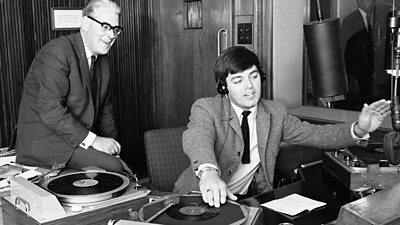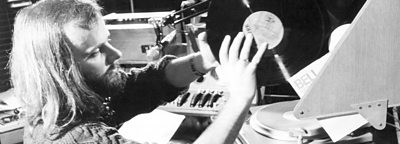Hardly anyone at the BBC wanted to employ the man who first appeared as a “guest DJ” co-hosting Top Gear on the afternoon of the second day of broadcasting by Radio 1, Sunday 1 October 1967.
Almost no-one involved in setting-up the new service would have believed it possible that John Peel, the hairy, shy, public-school educated 27 year-old pirate DJ from the Wirral, would go on to become the longest-surviving regularly on-air member of the original presentation line-up.
Long before his untimely death in 2004, Peel was the oldest DJ on the station; a winner of many broadcasting awards over more than 30 years; and a legendary, mould-breaking broadcaster, unequalled in public reputation and listeners’ affection as a champion of new music.
His work represents an ideal of a new way of presenting pop music on the radio, and yet it was an approach that was practically and professionally almost unimaginable in the BBC of 1967.
But at least three people in the corporation did believe in him. Bernie Andrews, producer of Top Gear, was determined to hire Peel for the revival of his hit live-sessions based rock show from 1964’s Light Programme, despite middle managers having instructed him not to do so.
Bernie’s former secretary Shirley Jones thought Bernie and Peel would make a good team too, and arranged for Peel to come in and have a chat with her new boss: the first controller of BBC Radio 1 and 2, Robin Scott.
Yet Scott, who had spent long nights over summer 1967 listening to tapes in his office of all the pirate DJs, had already made up his mind he wanted Peel on the station.
What he and Bernie Andrews saw in Peel were two different qualities, represented at first separately by the two shows he presented in Radio 1’s early years: Top Gear on Sunday afternoons; and the after-midnight Night Ride, which Peel started hosting on Wednesdays from March 1968 – but only after a direct intervention from Scott over-ruling his departmental managers and approving a pilot made by producer John Muir.
Bernie wanted Peel for his rebellious streak, his expertise, understanding and enthusiasm for the latest, most experimental pop and psychedelic sounds.
Scott, having listened to Peel’s infamous free-form Perfumed Garden show on Radio London during the Summer of Love, heard his potential as an unusual, relaxed, late-night voice in the dark.
But it was precisely these qualities that in the eyes of most BBC executives at the time made Peel unemployable.
Radio 1 DJs were not expected to have any say over the choice of music, that being chosen by the producer, shaped in the daytime by the new Radio 1 playlist.
BBC studios were traditionally not even set up to allow DJs to control the turntables. Only after major disagreements was Robin Scott permitted to install one “self-op” studio in Broadcasting House by launch date, where the daytime ex-pirate DJs could control the mix between their voice and the disks.

Even more controversial was the idea that any Radio 1 presenter would have the ability or intelligence to be allowed to talk to listeners, unscripted, without a music “bed” or backing track, about the music, or indeed anything else.
Bernie Andrews, however, from the very start split the choice of records half and half with Peel. It had been considered an outrage by his colleagues when he had allowed Brian Matthew, Top Gear’s original presenter in 1964, to choose just 3 or 4 of the records in each show.
But Bernie’s faith in Peel’s musical judgement was repaid when to the shock of everyone at Radio 1, Peel won “Best DJ” and Top Gear “Best Radio Programme”, in the Melody Maker Readers’ Poll of 1968. ‘John Peel: A Victory For The Music’, read the headline.
It’s revealing though that when interviewed by Tony Bilbow on BBC Two’s Late Night Line-Up immediately after the award, most of the conversation was about his other show, Night Ride. It was there that his individual presentational style was most noticeable beyond his pop audience: studiedly soft, ruminative and associative, and frankly, a bit hippy.
Those were the times, however, and his short-lived Night Ride became emblematic of the counter-culture era, with its guests and their – for the establishment – sometimes shocking statements. Robin Scott recalled being instructed by Lord Hill, new chairman of the BBC governors, to take Peel to an official dressing-down by Sir David Hunt, the High Commissioner for Nigeria, after the satirist John Wells had criticised Prime Minister Harold Wilson’s policy on the Biafran war – an experience that shook them both, and doubtless cemented Scott and Peel’s lifelong friendship.
That presentational style in the first 5 years of Radio 1 led many to characterise Peel’s voice as variously Liverpudlian, morose, lugubrious or druggy. He certainly aimed for a studied classlessness of accent, but none of those clichéd adjectives are accurate or fair of how his voice evolved.
Regular listeners to his Radio 1 show in any period from the late seventies, billed simply under his name from September 1975, will instead remember his wit, brevity, and focussed (if understated) enthusiasm for the music he was playing.
Those too young to have heard him - or if you’ve forgotten - can get an idea from The Evolution Of John Peel series of edited selections from his R1 shows from each decade presented on BBC 6 Music in September, most still available online. The clips of his links selected there are typical: mostly about 20 seconds long, not speaking over the records, talking up the music briskly, but in a self-deprecating manner. Try listening to almost any other radio DJ today, and you will find they speak for longer, but say less, to less effect - and often talk all over the music.
The significant thing about Peel therefore is that the way he presented – non-showbiz, enthusiastically, at times chaotically – was the perfect style to foreground the music. His voice was the glue that held it together, but what his style empowered was the music itself, and the effort he and his producers put into finding it. As Peel explained in a 1981 BBC2 Arena about the show, he was daily obliged to listen to hours and hours of new singles, albums and demo tapes just to try and keep up.
By the later years of his show, even before his long-standing producer John Walters retired in 1991, Peel was almost totally in control of the music he played, a unique presenter privilege then and now.
The three female producers who successively managed the show in its last decade – Alison Howe, Anita Kamath and Louise Kattenhorn – took control by scheduling creative editorial items like outside broadcasts, festival specials, live from Maida Vale studios nights, and shows with guests live from his home “Peel Acres” in Suffolk, all of which meant that Peel still got to write his running orders and choose the records.
In the months and years immediately after Peel’s death there was occasional hype about a DJ being “the new John Peel”, or complaints from listeners wondering “where is the new John Peel?” But there cannot be another Peel and it’s foolish to seek one.
His life and character, and the then historical conditions of British broadcasting, the BBC, and music, made him well-placed to nudge radio in a different direction. With his industry and enthusiasm, he took those breaks offered to him, in order to discover thousands of new bands, in those baby-boomer decades when pop was the only mass art form, “the new folk music” as Walters said.
There were other creative producer / presenter partnerships at Radio 1 and 2 in Peel’s time. There are DJs today, young and old, who have some considerable say over the music they play and who honour him in aspects of their presenting style. Huw Stephens at Radio 1, Bob Harris on Radio 2, and Gideon Coe and Peel’s son, Tom Ravenscroft, on 6 Music. That’s a personal choice. We can argue about it later.
But the Peel style remains the exception that proves the rule of how pop radio normally gets done. Most of it is playlisted, or chosen by producers. Most DJs still talk over the songs. And that can sound great. But not all the time. His achievements suggest there is always another way to choose the music, and always another way to present it.
Ken Garner is the author of The Peel Sessions (BBC Books, 2007). He teaches journalism at Glasgow Caledonian University.
-
The Evolution of John Peel Radio 6 Music
-
Keeping it Peel Radio 1 tribute pages about John Peel
-
John Peel Archive John Peel Centre for Creative Arts
-
Glasgow Caledonian University Department of Social Sciences, Media and Journalism
The DJs
-

John Peel
Ken Garner on the Radio 1 broadcaster -

Jimmy Young
The Man from Laramie -

Annie Nightingale
The first female presenter on Radio 1 and its longest-serving presenter




